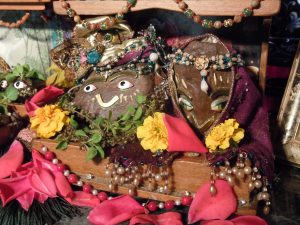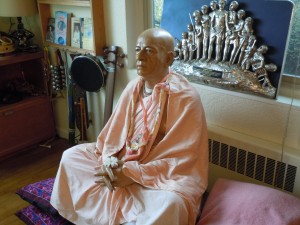BG 10.1 purport...The more one hears about the Supreme God, the more one becomes fixed in devotional service. One should always hear about the Lord in the association of devotees; that will enhance one’s devotional service. Discourses in the society of devotees can take place only among those who are really anxious to be in Kṛṣṇa consciousness. Others cannot take part in such discourses. The Lord clearly tells Arjuna that because he is very dear to Him, for his benefit such discourses are taking place.
(Note- I send out hundreds of such notices, but only the devotees who are serious are interested)
SB 6.1.49 purport....It should be understood that a person who does not have Vedic knowledge always acts in ignorance of what he has done in the past, what he is doing at the present and how he will suffer in the future. He is completely in darkness. Therefore the Vedic injunction is, tamasi mā: “Don’t remain in darkness.” Jyotir gama: “Try to go to the light.”
…..Even though he has a human body, a person in the mode of ignorance and interested only in his present body is like an animal, for an animal, being covered by ignorance, thinks that the ultimate goal of life and happiness is to eat as much as possible. A human being must be educated to understand his past life and how he can endeavor for a better life in the future. There is even a book, called Bhṛgu-saṁhitā, which reveals information about one’s past, present and future lives according to astrological calculations. Somehow or other one must be enlightened about his past, present and future. One who is interested only in his present body and who tries to enjoy his senses to the fullest extent is understood to be engrossed in the mode of ignorance. His future is very, very dark. Indeed, the future is always dark for one who is grossly covered by ignorance. Especially in this age, human society is covered by the mode of ignorance, and therefore everyone thinks his present body to be everything, without consideration of the past or future.
SB 6.1.51-The subtle body is endowed with sixteen parts—the five knowledge-acquiring senses, the five working senses, the five objects of sense gratification, and the mind. This subtle body is an effect of the three modes of material nature. It is composed of insurmountably strong desires, and therefore it causes the living entity to transmigrate from one body to another in human life, animal life and life as a demigod. When the living entity gets the body of a demigod, he is certainly very jubilant, when he gets a human body he is always in lamentation, and when he gets the body of an animal, he is always afraid. In all conditions, however, he is actually miserable. His miserable condition is called saṁsṛti, or transmigration in material life.
PURPORT-The sum and substance of material conditional life is explained in this verse.
SB 6.1.52-The foolish embodied living entity, inept at controlling his senses and mind, is forced to act according to the influence of the modes of material nature, against his desires. He is like a silkworm that uses its own saliva to create a cocoon and then becomes trapped in it, with no possibility of getting out. The living entity traps himself in a network of his own fruitive activities and then can find no way to release himself. Thus he is always bewildered, and repeatedly he dies.
PURPORT-As already explained, the influence of the modes of nature is very strong. The living entity entangled in different types of fruitive activity is like a silkworm trapped in a cocoon. Getting free is very difficult unless he is helped by the Supreme Personality of Godhead.
(Note–SB 4 .22.32-There is no stronger obstruction to one’s self-interest than thinking other subject matters to be more pleasing than one’s self-realization.
June 12 1974 conversation-
Devotee: Prabhupāda, what is the devotee’s greatest enemy? A devotee’s greatest enemy?
Prabhupāda: He, he himself. Because he’s a rascal, he’s his greatest enemy. So just get out of this rascaldom, and you become your friend. Nobody is enemy. You are yourself your enemy. Nobody is enemy. )
SB 6.1.53-Not a single living entity can remain unengaged even for a moment. One must act by his natural tendency according to the three modes of material nature because this natural tendency forcibly makes him work in a particular way.
PURPORT-The svābhāvika, or one’s natural tendency, is the most important factor in action. One’s natural tendency is to serve because a living entity is an eternal servant of God. The living entity wants to serve, but because of his forgetfulness of his relationship with the Supreme Lord, he serves under the modes of material nature and manufactures various modes of service, such as socialism, humanitarianism and altruism. However, one should be enlightened in the tenets of Bhagavad-gītā and accept the instruction of the Supreme Personality of Godhead that one give up all natural tendencies for material service under different names and take to the service of the Lord. One’s original natural tendency is to act in Kṛṣṇa consciousness because one’s real nature is spiritual. The duty of a human being is to understand that since he is essentially spirit, he must abide by the spiritual tendency and not be carried away by material tendencies.
SB 6.1.54 purport… The atmosphere of the subtle body at the time of death is created by the activities of the gross body. Thus the gross body acts during one’s lifetime, and the subtle body acts at the time of death. The subtle body, which is called liṅga, the body of desire, is the background for the development of a particular type of gross body, which is either like that of one’s mother or like that of one’s father.
SB 6.2.7-Ajāmila has already atoned for all his sinful actions. Indeed, he has atoned not only for sins performed in one life but for those performed in millions of lives, for in a helpless condition he chanted the holy name of Nārāyaṇa. Even though he did not chant purely, he chanted without offense, and therefore he is now pure and eligible for liberation.
PURPORT-..The Yamadūtas had considered only the external situation of Ajāmila. Since he was extremely sinful throughout his life, they thought he should be taken to Yamarāja and did not know that he had become free from the reactions of all his sins. The Viṣṇudūtas therefore instructed that because he had chanted the four syllables of the name Nārāyaṇa at the time of his death, he was freed from all sinful reactions. In this regard Śrīla Viśvanātha Cakravartī Ṭhākura quotes the following verses from the smṛti-śāstra:
nāmno hi yāvatī śaktiḥ pāpa-nirharaṇe hareḥ tāvat kartuṁ na śaknoti pātakaṁ pātakī naraḥ
“Simply by chanting one holy name of Hari, a sinful man can counteract the reactions to more sins than he is able to commit.” (Bṛhad-viṣṇu Purāṇa)
avaśenāpi yan-nāmni kīrtite sarva-pātakaiḥ pumān vimucyate sadyaḥ siṁha-trastair mṛgair iva
“If one chants the holy name of the Lord, even in a helpless condition or without desiring to do so, all the reactions of his sinful life depart, just as when a lion roars, all the small animals flee in fear.” (Garuḍa Purāṇa)
sakṛd uccāritaṁ yena harir ity akṣara-dvayam baddha-parikaras tena mokṣāya gamanaṁ prati
“By once chanting the holy name of the Lord, which consists of the two syllables ha-ri, one guarantees his path to liberation.” (Skanda Purāṇa)
These are some of the reasons why the Viṣṇudūtas objected to the Yamadūtas’ taking Ajāmila to the court of Yamarāja.
SB 3.25.33-Bhakti, devotional service, dissolves the subtle body of the living entity without separate effort, just as fire in the stomach digests all that we eat.
Some Conclusions-These above verses and purports are loaded with such valuable instructions which we must follow if we are to be successful in our human form of life. I particularly liked the SB descriptions of what composes our subtle bodies-it goes way beyond mind intelligence an false ego.
So like silkworms we are definitely trapped, by our own devices, in this temporary body and our only real business is to free ourselves from its clutches. That , as has been shown can be done very easily by chanting the names of God-Hare Krsna
damaghosa das



